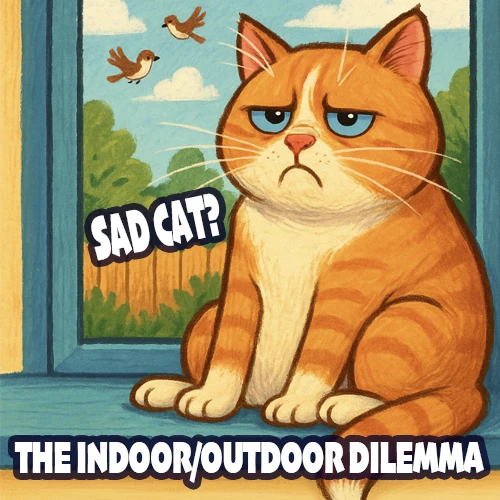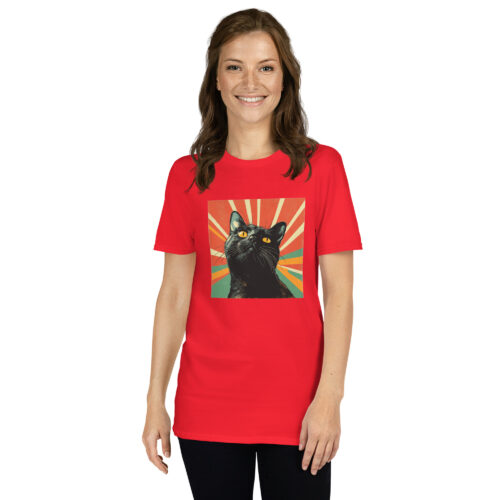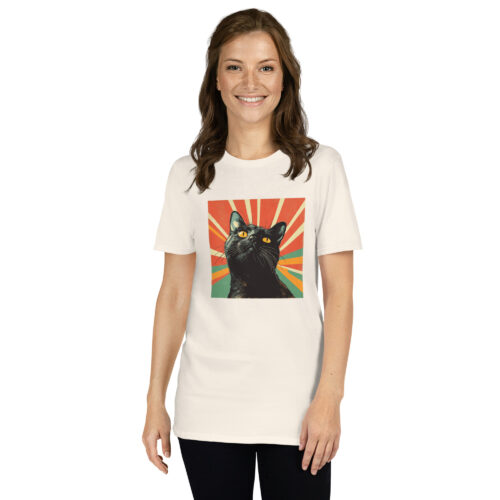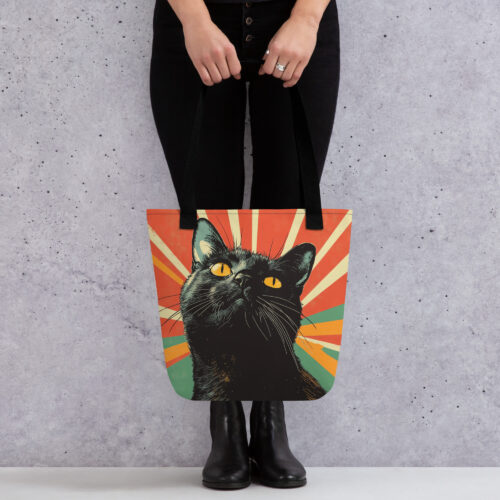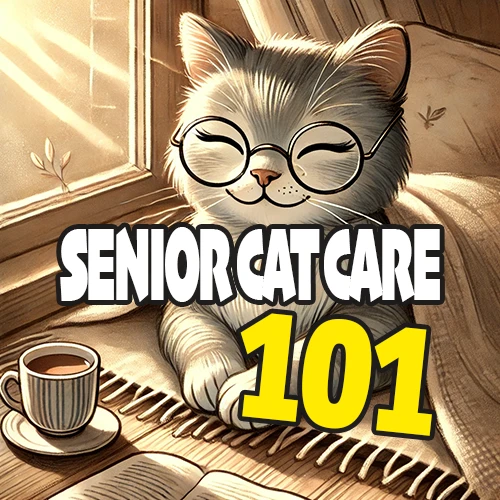
Senior Cat Care 101: Because Your Feline Friend Deserves the Royal Treatment
Table of Contents
Senior Cat Care 101 – Key Takeaways
- Senior Doesn’t Mean “Over”: Cats are considered senior around 11 years old, but age is just a number. Focus on your individual cat’s health and behavior.
- Watch for Changes: Be observant! Look out for changes in appetite, activity level, litter box habits, and grooming, as these can signal underlying health issues.
- Vet Visits are Crucial: Senior cats need biannual vet checkups for early detection and management of age-related diseases.
- Adjust Their Diet: Switch to a senior-specific food that’s easier to digest, lower in calories (if needed), and supports joint and cognitive health. Hydration is also important!
- Make Life Comfortable: Provide comfortable bedding, accessible litter boxes, and help with grooming if needed.
- Keep Them Stimulated: Even senior cats need mental stimulation through play and enrichment.
- Manage Pain: If your cat has arthritis or other painful conditions, talk to your vet about pain management options. Never give human pain medication.
- Be Patient & Understanding: Your senior cat is going through changes. Be patient, provide reassurance, and adjust their care as needed.
- Senior Care Differs From Kitten Care: Kittens require building a foundation and seniors need their comfort and health managed.
- Love & Care Make a Difference: Providing the right care and support can significantly improve your senior cat’s quality of life and help them enjoy their golden years.
Let’s face it, cats are masters of manipulation. They’ve trained us to be their personal servants from day one. But as they enter their golden years, that dynamic shifts – it’s less about them demanding pampering and more about us proactively ensuring their comfort and well-being. We’re talking senior cat care, folks! Think of it as their well-deserved retirement package, complete with extra cuddles and perfectly placed heating pads.
So, you might be wondering, when does a cat officially become a “senior”? And what exactly does “senior cat care” even entail? Don’t worry; we’re here to break it all down in a way that’s easy to understand and, dare we say, even a little bit fun (because who doesn’t love talking about cats?).
Age is Just a Number (Except When It Comes to Cat Years!)
While our feline companions may retain their youthful spirit well into their teens, the truth is, their bodies do change as they age. Typically, cats are considered “senior” around the age of 11. Once they reach 15, they often fall into the “geriatric” category. The American Animal Hospital Association (AAHA) offers a comprehensive overview of senior pet healthcare guidelines, emphasizing the importance of proactive care. Keep in mind, though, that these are just general guidelines; some cats age more gracefully than others!
The most important thing is to be observant of your cat’s individual needs and behavior. A sudden change in their routine or physical appearance could be a sign that something’s amiss.
What Changes Can You Expect? (Hint: It’s More Than Just Gray Whiskers)
Just like us, senior cats experience a variety of age-related changes. Some are subtle, while others are more pronounced. Being aware of these changes allows you to provide the appropriate care and support your feline friend needs. Here are some of the most common signs of aging in cats:
Decreased Activity Level: This is probably the most noticeable change. Your once-energetic cat might spend more time sleeping and less time playing. This can be due to a number of factors, including arthritis, muscle loss, and decreased energy levels.
Changes in Appetite and Weight: Some senior cats experience a decrease in appetite, while others actually eat more. Weight loss is a common concern, and can be a symptom of underlying health issues. On the flip side, decreased activity can also lead to weight gain, so managing their diet is vital. Consult with your vet for recommendations.
Litter Box Issues: This can manifest as accidents outside the litter box, difficulty getting in and out of the box, or changes in urine or stool consistency. Often, these are tied to underlying health concerns that need to be investigated by your veterinarian.
Cognitive Dysfunction Syndrome (CDS): Think of it as feline Alzheimer’s. CDS can cause disorientation, confusion, changes in sleep patterns, increased vocalization, and decreased interaction with family members. According to VCA Animal Hospitals, early recognition and management can significantly improve a cat’s quality of life with CDS.
Grooming Difficulties: As cats age, they may have trouble reaching certain areas of their body to groom themselves properly. This can lead to matted fur, skin irritation, and even infections.
Increased Thirst and Urination: This is a common symptom of kidney disease or diabetes, both of which are prevalent in older cats. If you notice your cat drinking more water than usual or having more frequent accidents, it’s important to consult with your vet right away.
Sensory Decline: Vision and hearing loss are common in senior cats. This can make them more easily startled and less responsive to their environment.
Dental Problems: Dental disease is incredibly common in cats of all ages, but it’s especially prevalent in senior cats. Dental problems can cause pain, difficulty eating, and even systemic health problems. The American Veterinary Medical Association (AVMA) stresses the importance of regular dental checkups for pets.
Senior Cat Care: A Practical Guide to Keeping Your Old Friend Happy
Now that we’ve covered the basics of aging in cats, let’s dive into the practical aspects of senior cat care. Here are some key things you can do to ensure your feline friend enjoys a comfortable and fulfilling life in their golden years:
Regular Veterinary Checkups: This is the cornerstone of senior cat care. Senior cats should see the vet at least twice a year for comprehensive checkups. These visits allow your vet to detect potential health problems early, monitor existing conditions, and adjust treatment plans as needed.
Dietary Adjustments: Talk to your vet about switching to a senior cat food. These foods are typically formulated to be easier to digest, lower in calories (to prevent weight gain), and higher in essential nutrients that support joint health and cognitive function.
Hydration is Crucial: Dehydration is a common problem in senior cats, especially those with kidney disease. Ensure your cat has access to fresh, clean water at all times. Consider using a pet water fountain to encourage drinking. Adding wet food to their diet can also help increase their water intake.
Litter Box Accessibility: Make sure your cat’s litter box is easily accessible. Choose a box with low sides if your cat has arthritis or mobility issues. Consider placing multiple litter boxes around the house, especially on different levels.
Comfortable Bedding: Provide soft, comfortable bedding in a warm, draft-free location. A heated bed can be particularly beneficial for cats with arthritis.
Grooming Assistance: Help your cat stay clean and comfortable by brushing them regularly. This will prevent mats and skin irritation, and it’s also a great way to bond with your feline friend.
Mental Stimulation: Just because your cat is slowing down doesn’t mean they don’t need mental stimulation. Provide them with interactive toys, scratching posts, and opportunities to explore their environment.
Pain Management: If your cat has arthritis or other painful conditions, talk to your vet about pain management options. There are many medications and supplements that can help alleviate pain and improve their quality of life. Never give your cat human pain medication, as many are toxic.
Cognitive Support: For cats with CDS, create a predictable routine and provide plenty of reassurance. Your vet may also recommend medications or supplements to help improve cognitive function.
Patience and Understanding: Remember that your senior cat is going through many changes, both physically and mentally. Be patient with them, and try to understand their needs. Your love and support will make a world of difference.
Kitten vs. Senior: A Tail of Two Life Stages
The needs of a kitten and a senior cat are vastly different. Here’s a quick comparison to highlight the key differences:
| Feature | Kitten Care | Senior Cat Care |
| Diet | High-calorie, growth-focused food | Lower calorie, easily digestible, senior-specific food |
| Vet Visits | Frequent vaccinations and checkups | Biannual checkups, with a focus on early disease detection |
| Exercise | High energy, lots of playtime | Gentle exercise, shorter play sessions |
| Environment | Kitten-proofed environment, lots of exploration | Safe, comfortable, and predictable environment |
| Focus | Building a strong foundation for growth | Maintaining comfort, managing age-related health issues |
The Bottom Line: Love and Understanding Go a Long Way
Caring for a senior cat requires patience, understanding, and a willingness to adapt to their changing needs. But the rewards are immeasurable. By providing your feline friend with the love, care, and support they need, you can help them enjoy a happy, healthy, and fulfilling life in their golden years. After all, they’ve given you years of companionship (and probably a few hairballs), so it’s time to return the favor! Now, go give your senior kitty a gentle head scratch – they deserve it!
Loved this post? Explore more helpful cat care tips on our cat blog and join our community of cat lovers to share stories and advice!
Disclosure: This post contains affiliate links. If you purchase through these links, we may earn a commission at no extra cost to you.



